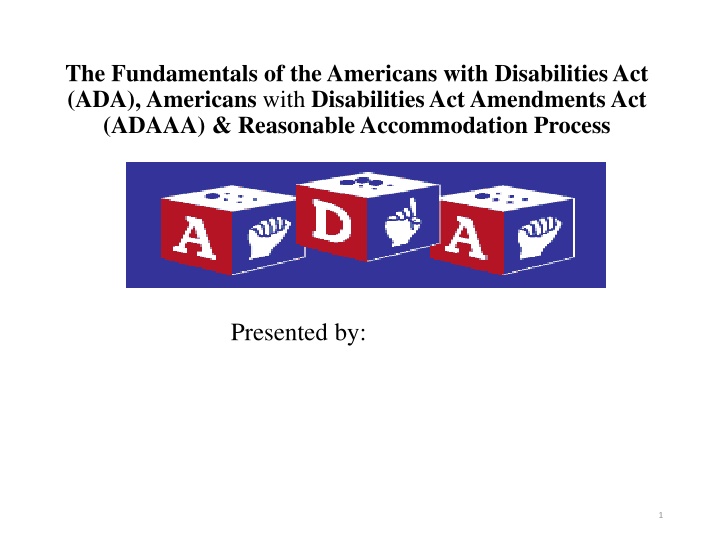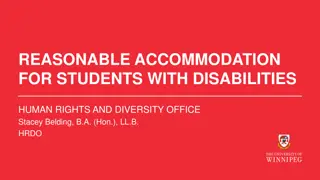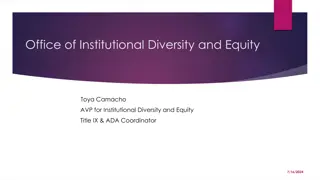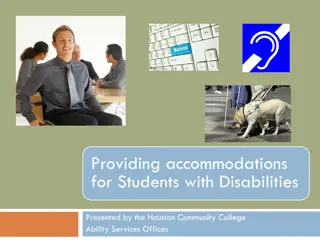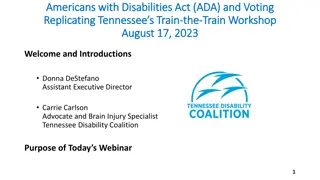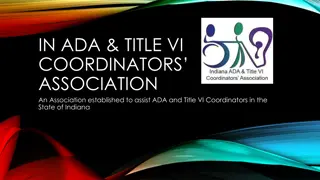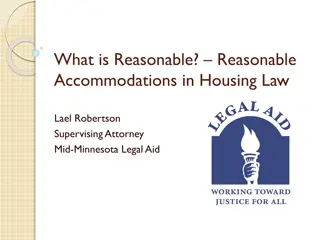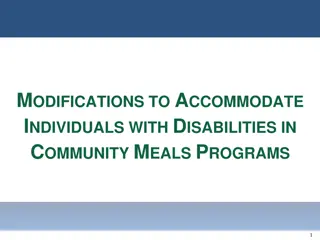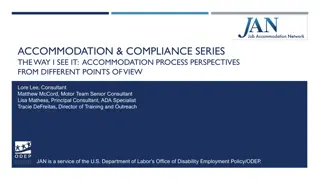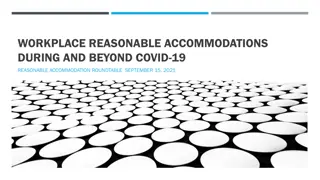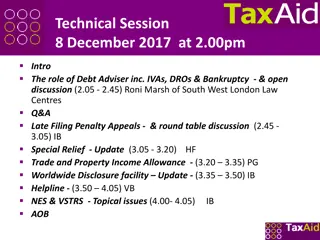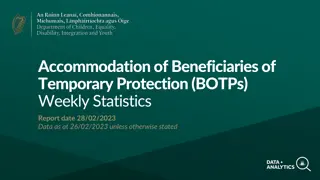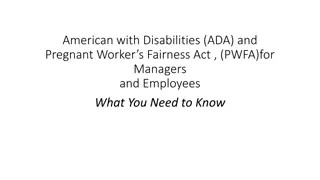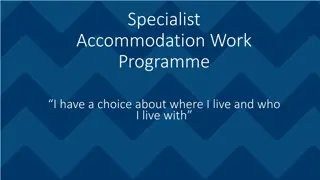Fundamentals of ADA, ADAAA & Reasonable Accommodation Process
This session covers the history of ADA and ADAAA, the definition of disabilities, reasonable accommodation process, ADA coordinator role, and more essential information.
Download Presentation

Please find below an Image/Link to download the presentation.
The content on the website is provided AS IS for your information and personal use only. It may not be sold, licensed, or shared on other websites without obtaining consent from the author.If you encounter any issues during the download, it is possible that the publisher has removed the file from their server.
You are allowed to download the files provided on this website for personal or commercial use, subject to the condition that they are used lawfully. All files are the property of their respective owners.
The content on the website is provided AS IS for your information and personal use only. It may not be sold, licensed, or shared on other websites without obtaining consent from the author.
E N D
Presentation Transcript
The Fundamentals of the Americans with Disabilities Act (ADA), Americans with Disabilities Act Amendments Act (ADAAA) & Reasonable Accommodation Process Presented by: 1
WHAT YOU WILL LEARN This informational session will provide you with fundamental knowledge of the ADA, ADAAA and Reasonable Accommodation process. The following information will be discussed: History of ADA & ADAAA Definition of a Disability defined by law Definition of a Reasonable Accommodation ADA Coordinator Role Responsibility of Management State of Maryland Reasonable Accommodation Request Policy and Procedure Reasonable Accommodation Process ADA & COVID 19 Pitfalls and Best Practices Questions 2
HISTORY OF ADA & ADAAA The Americans with Disabilities Act (ADA) was signed into law in 1990. The ADA is a civil rights law that prohibits discrimination against individuals with disabilities in all areas of public life, including jobs, schools, transportation, and all public and private places that are open to the general public. The ADA guarantees that people with disabilities have the same opportunities as everyone else to participate in the mainstream of American life -- to enjoy employment opportunities, to purchase goods and services, and to participate in State and local government programs and services. The ADA is divided into five (5) titles that relate to different areas of public life. 3
HISTORY OF ADA & ADAAA (Cont.) Title I (Employment) prohibits employers from discriminating against qualified individuals with disabilities in job application procedures, hiring, firing, advancement, compensation, job training, and other terms, conditions, and privileges of employment. Requires employers are to provide reasonable accommodations to qualified applicants and employees. Covers employers with 15 or more employees. Equal Employment Opportunity Commission (EEOC) is the federal agency that regulates and enforces title I of the law. The ADA was extended to the Americans with Disabilities Act Amendments Act (ADAAA) in 2008 and became effective on January 1, 2009. The ADAAA clarifies the definition of disability. 4
WHAT IS A DISABILITY AS DEFINED BY LAW? A physical or mental impairment that substantially limits one or more major life activity (such as walking, talking, seeing, hearing, or learning). A person who has a history or record of an impairment (such as cancer that is in remission). A person who is regarded or perceived by others as having an impairment. 5
WHAT IS A REASONABLE ACCOMMODATION? Modifications or adjustments to a job application process that enable a qualified applicant with a disability to participate in the hiring process; Modifications or adjustments to a job or work environment that enable a qualified individual with a disability to perform the essential functions of that position; or Modifications or adjustments that would enable an employee with a disability to enjoy equal benefits and privileges of employment as are enjoyed by other employees. Only individuals who have an actual disability, or who have a record of a disability are entitled to accommodations; individuals who are regarded as having a disability are not entitled to accommodations. 6
EXAMPLES OF REASONABLE ACCOMMODATIONS A deaf applicant who needs a sign language interpreter during the job interview. An employee with diabetes who needs regularly scheduled breaks during the workday to eat a snack and monitor blood sugar and insulin levels. A blind employee who needs equipment on his/her computer to enlarge the print. A deaf employee who needs text to speak equipment. An employee with cancer who needs leave to have radiation or chemotherapy treatments. 7
ADA COORDINATOR ROLE Coordinates the interactive process with the employee and designated manager/supervisor during the reasonable accommodation process. Trains managers, supervisors and employees on the disability laws and reasonable accommodation process. Administers reasonable accommodations to all qualified employees and job applicants. Ensures that meeting/conference rooms, lunch rooms and employment test are accessible. Ensures all agency accessibility requirements are met. 8
RESPONSIBILITY OF MANAGEMENT Connects employees and job applicants with the agencies ADA Coordinator for assistance. Cooperates with the ADA Coordinator and HR during the reasonable accommodation interactive process. Remains impartial, open-minded and confidential at all times. Participates in the interactive process and makes accommodation recommendations. Attends ADA and EEO training. Do not subject an employee(s) to retaliation due to their request for an accommodation. 9
STATE OF MARYLAND REASONABLE ACCOMMODATIONS POLICY AND PROCEDURE 10
STATE OF MARYLAND REASONABLE ACCOMMODATIONS POLICY The State of Maryland is dedicated to full compliance with the reasonable accommodation requirements and the ADA. No employee shall be retaliated against for seeking a reasonable accommodation for a disability. 11
REASONABLE ACCOMMODATION PROCESS Employees and Applicants may request an accommodation at anytime during employment and the hiring process to the ADA Coordinator, supervisor, manager, Recruitment Rep, or HR. Accommodation requests do not have to come directly from the employee or applicant. Requests can come from a spouse, parent, physician, job coach, union rep, etc. Employees may mention to their supervisor or manager challenges they are experiencing while performing their job duties that are related to a medical condition. 12
REASONABLE ACCOMMODATION PROCESS (cont.) The ADA does not indicate a specific time frame for an employer to decide an accommodation request. The law requires the employer to respond to accommodation requests expeditiously. The decision to grant or deny a reasonable accommodation will be provided to the employee and manager in writing. The employer is not required to provide the accommodation requested but must provide an accommodation that is reasonable and effective for both the employee and employer. A confidential ADA file is created for the employee that is separate from the personnel file in Personnel Services. 13
REASONABLE ACCOMMODATION INTERACTIVE PROCESS The ADA requires the employer to engage in the interactive process. Failure to do so may result in significant legal consequences. Gather Information Explore Accommodation Options Choose an Accommodation Implement Accommodation Monitor Accommodation 14
DENIAL OF ACCOMMODATION REQUESTS Undue Hardships are determined on a case-by-case basis. Factors to consider are: The nature and net cost of the accommodation needed; The overall financial resources of the facility or facilities involved in the provision of the reasonable accommodation; The type of operation or operations of the division; Whether the accommodation poses a direct threat to the health and safety of other employees and other persons associated to the business; and The impact of the accommodation upon the operation of the facility, including the impact on the ability of other employees to perform their duties and the impact on the facility s ability to conduct business. 15
ADA AND COVID 19 Covid-19 has changed how we operate in unpreceded ways. Despite such challenges, employers are still required to comply with ADA laws. 16
ADA AND COVID 19 Some common reasons an employee may request a reasonable accommodation related to COVID-19: General fear of contracting COVID-19 Fear of exposing a vulnerable family member to COVID-19. Having an underlying health conditions Difficulties with arranging child care General fear of potential unsafe work environment 17
Some Common Pitfalls Ignoring a request- this is the same as denying a request. Making assumptions about the accommodation that is needed. Sharing an employee s disability with other employees who do not need to know the information. Not considering an employee s need for an accommodation when scheduling training or other work activities. 18
BEST PRACTICES Do not predetermine whether or not the condition is a disability. Focus on the accommodation. Request medical documentation from qualified medical personnel before providing an accommodation, if needed. Keep an open mind during the interactive process. Refer all ADA matters to the ADA Coordinator. DO NOT RETALIATE! 19
QUESTIONS 20
OSEEOC CONTACTS Glynis Watford Statewide EEO Coordinator Glynis.watford@Maryland.gov 410-767-4061 Nicole Webb Senior EEO Compliance Officer Nicole.webb@Maryland.gov 410-767-4761 Denise Green EEO Compliance Officer/EEO Officer ADA Coordinator (DBM & DO-IT) Denise.green@Maryland.gov 410-767-1013 Norma Belton Compliance Coordinator Norma.belton@Maryland.gov 410-767-4735 21
REFERENCES Equal Employment Opportunity Commission https://www.eeoc.gov/ Department of Budget and Management http://dbm.maryland.gov/eeo/Pages/EEOHome.aspx Job Accommodation Network (JAN) https://askjan.org/ 22
